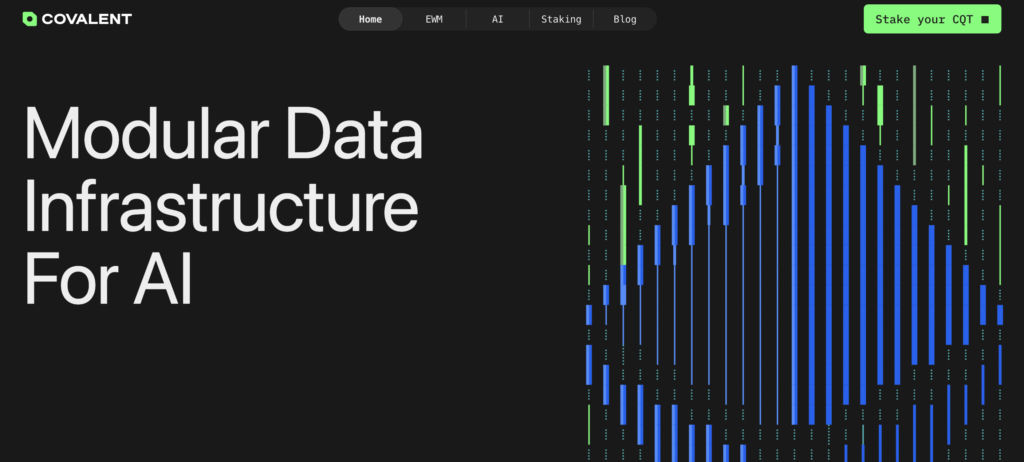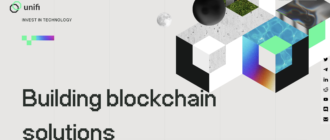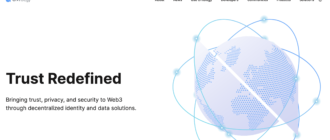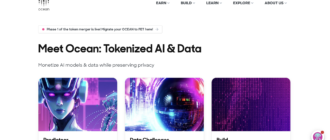In this article, we delve into Covalent, a prominent project in the cryptocurrency and blockchain space, and its native token, Covalent Query Token (CQT). Covalent is known for its innovative approach to providing unified API access to blockchain data, simplifying the complexities of blockchain queries and making decentralized data more accessible and usable. We will explore the various facets of Covalent, including its technological foundation, the role and functionality of the CQT token, the project’s tokenomics, its ecosystem, and the potential for future growth and development. By understanding these elements, readers can gain a comprehensive insight into Covalent and its significance in the evolving landscape of blockchain technology.

What is Covalent?
Covalent is a blockchain technology project designed to provide a unified and comprehensive API to access on-chain data. Unlike traditional blockchain explorers or APIs that often require specific queries for individual blockchains, Covalent simplifies the process by offering a single API endpoint that aggregates data across multiple blockchains. This approach allows developers to retrieve detailed, granular, and high-fidelity blockchain data without the complexity typically associated with decentralized networks. Covalent’s primary mission is to democratize access to blockchain data, making it easier for developers, analysts, and businesses to build applications, conduct research, and make informed decisions based on accurate and complete blockchain data.
Project History
Covalent was founded with the vision of overcoming the fragmentation and accessibility issues in blockchain data. The project emerged in response to the growing need for a reliable and user-friendly solution to query blockchain information across different networks. Since its inception, Covalent has achieved several significant milestones. Initially, the project focused on developing its core API technology, ensuring it could deliver comprehensive data from various blockchains.
Key milestones in Covalent’s development include the successful launch of its beta API, which allowed early adopters to test and provide feedback. Following the beta phase, Covalent expanded its support to include a broader range of blockchains, thereby increasing its utility and appeal to a wider audience. Another critical milestone was the introduction of the Covalent Query Token (CQT), designed to facilitate governance and incentivize data query contributions within the network. Additionally, Covalent has forged partnerships with several leading blockchain projects and platforms, enhancing its ecosystem and driving further adoption.
Throughout its history, Covalent has remained committed to its goal of making blockchain data accessible and actionable, continuously improving its technology and expanding its reach within the blockchain community.
How Covalent Works
Covalent operates on the foundation of a robust technological framework designed to provide seamless and comprehensive access to blockchain data. The core of Covalent’s technology is its unified API, which leverages advanced indexing and querying mechanisms to aggregate data from multiple blockchains into a single, easy-to-use interface. This approach eliminates the need for developers to navigate the complexities of different blockchain architectures, offering a streamlined solution for accessing diverse blockchain data sets.
Technology and Differentiation
Covalent employs a range of technologies to achieve its goals. At its heart is the use of Big Data technologies, including distributed storage systems and parallel processing frameworks, which allow it to handle and query vast amounts of blockchain data efficiently. The project’s use of advanced indexing ensures that data retrieval is both fast and accurate, providing users with high-fidelity insights that are essential for developing decentralized applications (dApps), conducting thorough blockchain analyses, and more.
One of the distinguishing features of Covalent is its ability to provide data not just from the blockchain itself, but also from smart contracts, transaction logs, and wallet balances, offering a holistic view of the blockchain ecosystem. This comprehensive data aggregation sets Covalent apart from traditional blockchain explorers or APIs that often have limited scope and require multiple queries to gather complete data sets.
Project Blockchain and Consensus Mechanism
Covalent does not operate its own blockchain but rather integrates with various existing blockchain networks to gather and index data. However, the Covalent Query Token (CQT) operates within the Ethereum ecosystem as an ERC-20 token. The choice of Ethereum as the base blockchain for CQT leverages Ethereum’s robust infrastructure, widespread adoption, and secure consensus mechanism.
Ethereum currently uses a Proof of Stake (PoS) consensus mechanism, following its transition from Proof of Work (PoW) with the Ethereum 2.0 upgrade. PoS is more energy-efficient compared to PoW and enhances network security and scalability. Validators in PoS are chosen based on the number of tokens they hold and are willing to “stake” as collateral, which aligns their incentives with the network’s health and integrity.
In the context of Covalent, CQT plays a crucial role in the network’s governance and incentivization model. Token holders can participate in governance decisions, influencing the project’s direction and development. Additionally, CQT is used to reward participants who contribute valuable data queries, ensuring the continuous and reliable operation of the Covalent network.
By combining these advanced technologies and strategic integrations, Covalent provides a powerful and user-friendly solution for accessing comprehensive blockchain data, setting it apart from other data providers in the blockchain space.
Tokenomics of Covalent
Covalent Query Token (CQT) is a token, not a coin. This distinction is crucial as it highlights that CQT operates on an existing blockchain (Ethereum) rather than having its own native blockchain.
Emission Model
CQT follows a fixed supply model with a total cap of 1 billion tokens. The initial distribution of CQT was designed to ensure a balanced allocation that supports the project’s long-term goals and ecosystem growth. Here’s a breakdown of the token distribution:
| Allocation | Percentage | Amount (CQT) |
|---|---|---|
| Private Sale | 15% | 150,000,000 |
| Public Sale | 10% | 100,000,000 |
| Team and Advisors | 20% | 200,000,000 |
| Ecosystem Development | 25% | 250,000,000 |
| Community Rewards | 30% | 300,000,000 |
Utility and Function
CQT serves multiple purposes within the Covalent ecosystem. Primarily, it is used for governance, allowing token holders to vote on proposals that shape the future of the network. This decentralized governance model ensures that the development and direction of the project are community-driven.
Additionally, CQT is used to incentivize data query contributions. Users who provide valuable data or perform significant network functions can earn CQT as a reward. This incentivization mechanism ensures the network remains robust, reliable, and continuously improving.
Price and Market Performance
Since its introduction, CQT has been traded on several major cryptocurrency exchanges. Its price has been subject to the typical volatility seen in the cryptocurrency markets, influenced by factors such as market demand, overall crypto market conditions, and the ongoing development and adoption of the Covalent platform.
As of the latest data, CQT’s market performance reflects its utility and adoption within the blockchain space. The token’s price history shows fluctuations that are common in the market but indicate a steady interest and investment in Covalent’s solutions.
Staking and Rewards
CQT also supports staking, allowing holders to lock their tokens in the network in exchange for rewards. This staking mechanism not only provides an incentive for long-term holding but also enhances network security and stability. Stakers are rewarded with additional CQT, which is distributed from a predefined staking pool set aside from the total supply.
The comprehensive tokenomics of Covalent, with its fixed supply, diverse utility, and strategic distribution, play a critical role in the project’s growth and sustainability. By aligning incentives across different stakeholders, Covalent ensures active participation and continuous development of its ecosystem.
Where to Buy Covalent Query Token (CQT)
CQT can be purchased on several major cryptocurrency exchanges. Below is a list of exchanges where CQT is actively traded:
- Gate.io: Gate.io provides a robust platform for trading CQT with various fiat and cryptocurrency pairs.
- MEXC: MEXC offers CQT trading with a focus on providing high liquidity and competitive trading fees.
- BingX: BingX allows for seamless trading of CQT, featuring advanced trading tools and a user-friendly interface.
- KuCoin: KuCoin supports CQT trading and is known for its extensive selection of cryptocurrencies and trading pairs.
These exchanges provide multiple options for purchasing CQT, whether you’re looking for spot trading, futures, or other trading products.
Where to Store Covalent Query Token (CQT)
CQT can be stored in several types of cryptocurrency wallets that support ERC-20 tokens. Here are some recommended options for securely storing your CQT tokens:
- MetaMask: MetaMask is a popular web-based wallet that allows users to store ERC-20 tokens like CQT. It offers a browser extension and mobile app, making it convenient for managing your tokens.
- Trust Wallet: Trust Wallet is a mobile wallet that supports a wide range of cryptocurrencies, including ERC-20 tokens. It provides a secure and user-friendly interface for managing your CQT.
- Ledger Nano S/X: Ledger hardware wallets offer one of the most secure ways to store CQT. These devices store your private keys offline, protecting your tokens from online threats.
- MyEtherWallet (MEW): MEW is a web-based wallet specifically designed for Ethereum and ERC-20 tokens. It offers a high level of security and is compatible with hardware wallets for added protection.
- Trezor: Trezor is another hardware wallet option that provides top-notch security for storing CQT by keeping your private keys offline.
Each of these wallets offers different features, from ease of access and usability to enhanced security measures. When choosing where to store your CQT, consider your needs for convenience versus security, and select the wallet that best fits your requirements.
Project Prospects
Covalent’s growth prospects are founded on its ability to address critical challenges in the blockchain space: data accessibility and usability. By providing a unified API that simplifies access to complex and diverse blockchain data, Covalent positions itself as an essential tool for developers, analysts, and enterprises. The increasing demand for decentralized applications (dApps) and the growing importance of blockchain analytics are key drivers of Covalent’s potential market expansion.
Clients and Partners
Covalent has garnered a broad and diverse clientele, ranging from developers and blockchain projects to financial institutions and analytics firms. Its clients rely on Covalent for accurate, comprehensive, and easily accessible blockchain data, which is crucial for building dApps, conducting research, and making data-driven decisions.
Key partners include:
- Polygon: A collaboration that enhances data accessibility on the Polygon network.
- Avalanche: Partnership to provide comprehensive data solutions for Avalanche users.
- Elrond: Integration with Elrond to support data querying across its blockchain.
- Moonbeam: Partnership to extend data services to Moonbeam’s ecosystem.
These partnerships not only expand Covalent’s reach but also integrate its solutions into some of the most prominent and rapidly growing blockchain platforms.
Growth Forecast
The future of Covalent looks promising, with several factors indicating continued growth and adoption:
- Increasing Blockchain Adoption: As blockchain technology becomes more mainstream, the need for reliable and accessible data will grow, boosting demand for Covalent’s services.
- Expansion of DeFi and NFTs: The rise of decentralized finance (DeFi) and non-fungible tokens (NFTs) creates additional use cases for comprehensive blockchain data, driving further utilization of Covalent’s API.
- Innovative Development: Covalent’s ongoing technological advancements and new feature rollouts will enhance its product offering, attracting more users and retaining existing ones.
Ecosystem
Covalent’s ecosystem is designed to foster innovation and collaboration within the blockchain space. It comprises various components that work together to support and enhance the overall functionality of the platform.
Ecosystem Components
- Unified API: The backbone of Covalent, providing easy access to detailed blockchain data across multiple networks.
- CQT Token: Powers the network’s governance and incentivization mechanisms, ensuring decentralized decision-making and rewarding contributions.
- Developer Tools: Including SDKs and documentation that simplify integration with Covalent’s API for developers.
- Partnership Network: Collaborations with leading blockchain platforms to extend data services and support diverse blockchain ecosystems.
Key Ecosystem Partners
- Chainlink: Utilizes Covalent for enhanced data reliability and availability within its oracle network.
- Balancer: Integrates Covalent’s data for improved DeFi operations and analytics.
- 1inch: Leverages Covalent’s data solutions to optimize decentralized exchange (DEX) functionalities.
By building a robust and interconnected ecosystem, Covalent ensures that it remains at the forefront of blockchain data solutions, driving adoption and innovation within the industry.
Conclusion
Covalent represents a significant advancement in the realm of blockchain data accessibility, addressing critical challenges faced by developers and users alike. Through its robust technology and strategic implementation, Covalent has positioned itself as a vital tool in the blockchain ecosystem. The project’s unique approach and ongoing developments suggest a promising trajectory, potentially driving further innovation and adoption in the blockchain space. As the industry continues to grow, Covalent’s contributions will likely play a crucial role in shaping the future of decentralized data access.






